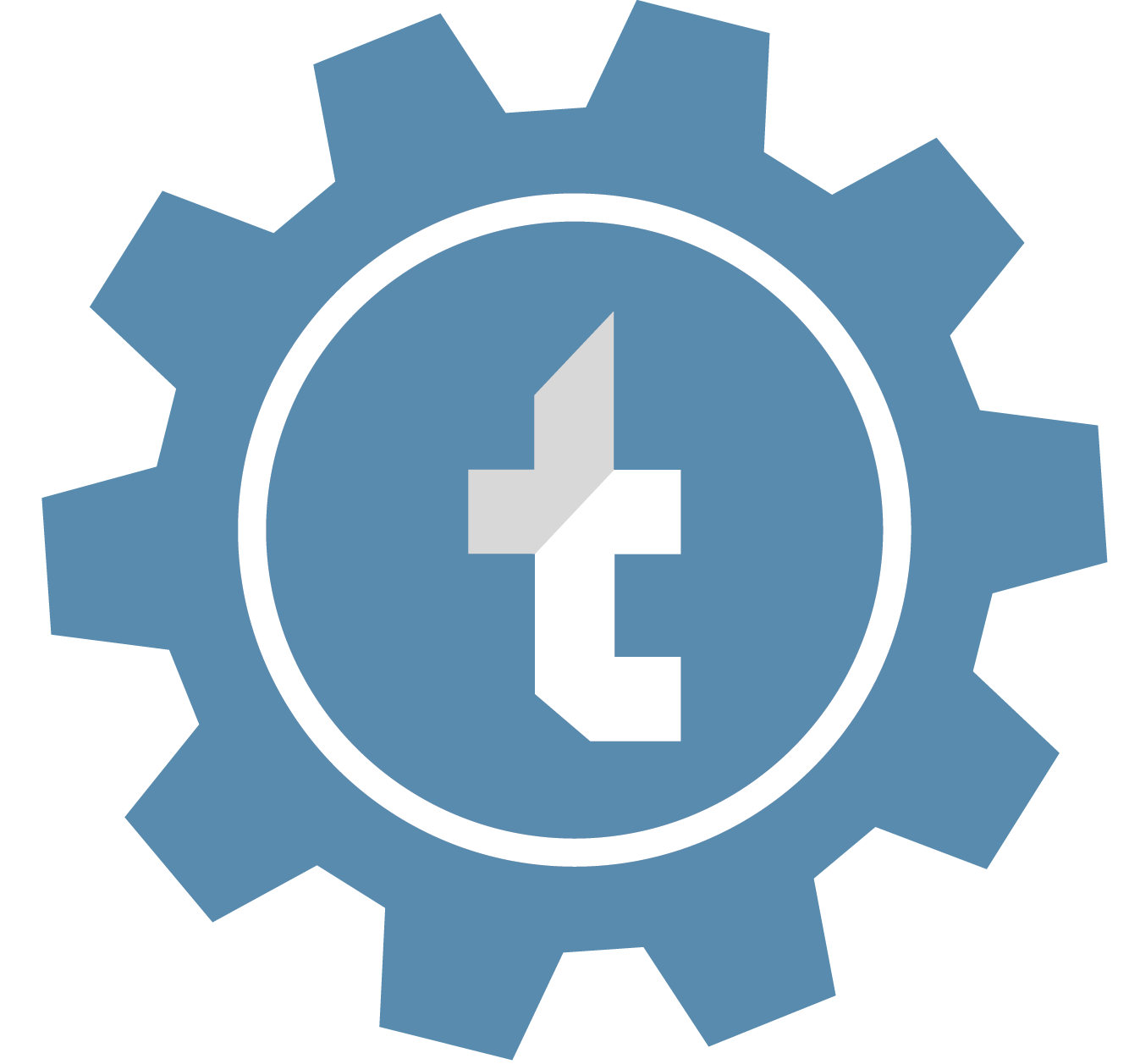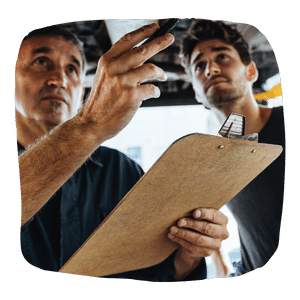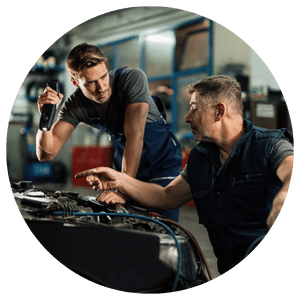November 17, 2023
.png)

Written by:
Today's Class Team
If there's one constant in our industry, it's the enduring need to grow and expand our skill sets. However, the real challenge lies in deciding how to go about enhancing these skills. Should you opt for immersive hands-on experience, learning on the job as you go — or do you dive into comprehensive training programs that equip you with more formal knowledge? The answer isn't always clear-cut, and that's where the art of striking a balance comes into play.
Formal training acts as the sturdy foundation upon which auto professionals construct their careers. It equips individuals with the essential foundational knowledge, safety protocols, and industry best practices they need. Training programs, whether they be online or in classrooms, serve several purposes for team members of all experience levels.
careers. It equips individuals with the essential foundational knowledge, safety protocols, and industry best practices they need. Training programs, whether they be online or in classrooms, serve several purposes for team members of all experience levels.
Continuous training is the means through which we keep our skills sharp and up-to-date. It serves as an ongoing journey for auto professionals to refine and elevate their existing skill sets, transforming them into highly productive and efficient experts.
By engaging in regular training sessions, professionals delve deeper into the intricacies of their craft, fine-tuning their abilities and staying abreast of the latest industry trends. It's a proactive approach that not only hones their existing skills but also introduces them to innovative techniques and methodologies.
This continuous skill maintenance ensures that professionals are not only competent in their current tasks but are also well-equipped to handle emerging challenges with precision and confidence. It's not just about staying up-to-date; it's about proactively evolving and becoming increasingly adept, contributing to a more robust and skilled team.
In the face of a changing automotive landscape, the demand for auto professionals to adapt to technological advances becomes a necessity. Staying well-informed is not merely a choice but a fundamental requirement to provide the highest caliber of service to customers. Modern vehicles have transcended traditional mechanics, incorporating intricate electronic systems and advanced materials. These sophisticated components demand a specialized level of knowledge from professionals.
Training programs play a pivotal role in equipping team members with the expertise needed to seamlessly navigate any complex situation. Whether it's comprehending the intricacies of hybrid engines, staying knowledgeable of the latest developments in electric vehicles, or mastering advanced diagnostic tools, these training initiatives empower professionals to confidently address the challenges posed by cutting-edge automotive technologies. In essence, adapting to technological advances isn't just a response; it's a proactive commitment to excellence in an industry shaped by innovation.
Read More: Preparing Your Team for a Changing Industry
This commitment to consistent quality assurance through training programs goes beyond setting a standard; it cultivates a culture of excellence within the automotive professional community. By instilling a shared understanding of the highest quality benchmarks, these programs create a collective dedication to delivering dependable and top-tier service.
The significance of this consistency transcends individual skill levels; it's a pledge to customers that every interaction, every repair, and every service will meet the same unwavering standard of excellence. As a result, errors are minimized, and the risk of subpar work is significantly reduced.
This reliability doesn't just fulfill expectations; it builds trust among customers, establishing a reputation for the auto professionals as reliable and quality-driven experts in their field. In an industry where trust is vital, this commitment to consistent quality assurance becomes a cornerstone for long-term success and customer satisfaction.
Hands-on experience is where theory transforms into action. It's where auto professionals truly refine their skills and gain invaluable insights into real-world problem-solving. The significance of hands-on experience cannot be understated for a well-rounded team.
Hands-on experience is the way auto professionals transform formal training into practical mastery. It's a dynamic platform for real-world problem-solving, honing professionals' abilities to adapt to unexpected challenges encountered on the shop floor. From diagnosing complex engine issues to resolving intricate mechanical problems, hands-on experience sharpens their problem-solving skills in ways that formal learning alone cannot replicate.
Additionally, this immersive approach cultivates the mastery of tools and techniques, offering a deeper understanding. On the shop floor, technicians evolve into true masters of their trade, developing a keen eye for detail and a proficiency that extends beyond the confines of textbooks, creating a uniquely skilled and adaptable workforce.
Hands-on experience is not just about refining technical skills; it plays a crucial role in building confidence and adaptability among auto professionals. This is instrumental in helping professionals learn to trust their skills in live, hands-on situations.
The adaptability cultivated in this environment is indispensable. It's the ability to navigate unexpected challenges, innovate solutions on the fly, and seamlessly apply concepts to real-world scenarios. This dual development of confidence and adaptability becomes a cornerstone for delivering high-quality work consistently.
 The Role of Mentoring
The Role of MentoringMentoring adds a layer of richness to hands-on learning. Seasoned professionals, through mentorship, don't just guide newcomers — they contribute to the holistic development of the next generation. The passing of the torch is not just about technical skills; it includes insights into industry nuances, client interactions, and effective problem-solving approaches.
This mentorship dynamic not only accelerates the practical skill development of newcomers but also ensures the preservation and dissemination of the invaluable wisdom accumulated by experienced hands. In this way, the role of mentoring becomes a bridge between generations, fostering a culture of continuous improvement and knowledge sharing within the auto professional community.
To really hit the sweet spot for peak performance in auto shops, think of training, both online and in classrooms, and hands-on experience as the ultimate power duo, not rivals but partners in crime. It's not about picking sides; it's about finding the groove where these two can come together. This synergy helps to mold proficient automotive professionals capable of navigating the industry's multifaceted challenges.
The crux of success lies in striking the right balance. Training is the necessary knowledge base, serving as the framework for skills development, while hands-on experience helps to reinforce and refine your team's development. This collaboration is essential as hands-on learning can come at a premium for shops, whether it be time, cost, or lost revenue. When you make that investment into your team, it's important to increase the odds that said investment pays off in the long run. With foundational training, you can rest easier knowing your team is well prepared and that time does not go to waste.
In the quest for the delicate balance between training and hands-on experience, the selection of training programs becomes pivotal. Optimal professional development hinges on choosing programs precisely tailored to the specific needs of auto professionals. These programs should transcend one-size-fits-all approaches, instead offering a nuanced understanding of the challenges faced on the shop floor.
By focusing on enhancing practical skills, these tailored programs bridge the gap between formal classroom learning and the nuanced demands of real-world application. The flexibility of these programs is equally vital, accommodating the schedules and unique circumstances of working professionals. It's about aligning the training with the dynamic needs of the automotive industry, ensuring that professionals emerge not only with enhanced knowledge but also with the practical prowess demanded by their day-to-day responsibilities.
Read More: The Benefits of Online Training for Automotive Technicians
In the fast-paced world of the automotive industry, finding the ideal equilibrium between hands-on experience and training is important for the success of your shop. Today's Class offers tailored training solutions designed to empower your team with the ability to retain knowledge and apply it effectively.
By choosing Today's Class, you're making an investment in the development of a well-rounded, highly skilled team capable of navigating the ever-changing challenges of the automotive realm. Contact our team today to elevate your professionals, striking the perfect balance between practical hands-on experience and comprehensive training for sustained excellence. Your journey to peak performance in the automotive industry starts with Today's Class.
Keep Reading:
When you think about boosting your shop's performance, increasing your car count or average repair order might be the first things that come to mind. Of course, those are definitely areas you should...
Hiring a new technician is much more than just expanding your team; it's an opportunity to mold the future of your auto repair shop. As a service manager, your role in championing the continuous...
Annual reviews are key to shop growth. They help you see where everyone stands and plan the path ahead. But what if you could get an even clearer – and measurable – picture? That’s where automotive...
2700 Corporate Drive
Suite 200
Birmingham, AL 35242
91fc.png)